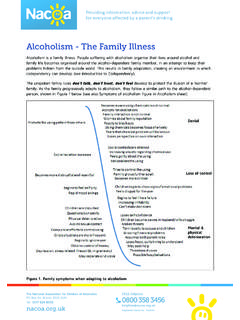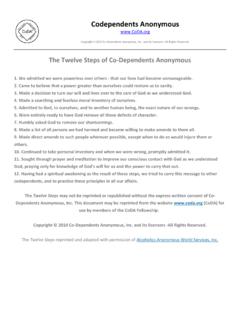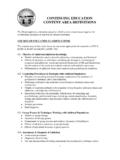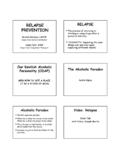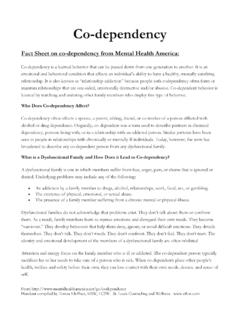Transcription of Introduction to Codependency - Nacoa
1 Providing information, advice and support for everyone affected by a parent's drinking Introduction to Codependency Codependency is a term used to describe the way in which someone, who has problems with alcohol or drugs (or a similar addictive problem) affects the family and individual psychology. Codependency is a learned behaviour, which has its origin in dysfunctional family relationships and is prevalent in families who attempt to keep their problems secret from the outside world. Drink is one of the hidden sufferings in families . Dr Mo Mowlam Patron, 1996-2005. The condition results from adapting to dysfunction in a family and is passed from one generation to the next through rigid rules and irrational belief systems so that children grow up with a diffuse sense of identity and a need to control others in order to feel secure.
2 Families develop patterns of behaviours which include denial, compliance and control, allowing the family to deny reality in an effort to avoid painful realities. This results in low self-esteem, fear and feelings of guilt and shame for the family as a whole and the individuals who make up the family. These families are often referred to as shame-based which gives rise to the following unspoken family rules: Don't talk Don't trust Don't feel People who grow up with these rules depend on others for their sense of self-esteem and have little sense of their own identity, except in relation to others. I am my brother's sister, my father's daughter, my husband's wife, so who am I?
3 Helpline caller - sister, daughter and wife of alcoholics Codependents adapt their personalities, beliefs, thoughts and feelings from those around them in an attempt to feel loved and needed. They meet the needs of others, instead of living their own lives and often confuse love with need and feel loved only if they are needed, their significant others would be unable to cope without them. Codependents often find difficulty in ending destructive relationships because of their innate fear of abandonment and being alone, remaining in abusive relationships simply because it gives them a sense of being needed'. No one else would look after him. There are difficult times but he is always so sorry in the morning.
4 He promises he won't hurt me again.. Helpline caller, 24 year old married to an alcoholic husband The National Association for Children of Alcoholics FREE Helpline PO Box 64, Bristol, BS16 2UH. Tel: 0117 924 8005 0800 358 3456. Registered Charity No: 1009143. Providing information, advice and support for everyone affected by a parent's drinking Major Symptoms 1. Development of unhealthy defences to deal with emotional pain Attempting to control fear, anger, hurt shame and blame rather than dealing with problems as they arise. 2. An inability to identify or express feelings The family rules don't talk, don't trust, don't feel ensure that children keep quiet about problems, do not develop trust in others and eventually suppress their feelings in order to cope with a backlog of emotional (and sometimes physical) pain.
5 These rules are not easily broken in adulthood and remain as a way to cope . a solution, rather than a problem. 3. Difficulty in intimate relationships Growing up with crisis relationships is common in codependent families and similar relationships will be sought because they are familiar. Codependents develop rigid or non-existence boundaries in order to shield themselves from others or to blend into other people's lives. They often swing between feeling victimised and taken advantage of, or feeling powerful when taking on a martyr-like role. However, when self-esteem relies on someone else their loss signals an end to personal wellbeing. Fear of abandonment and exposing the real self leads to an inability to break the cycle of unhealthy relationships; whilst playing a role, leads to feelings of self-loathing if you knew who I really am, you would loathe me'.
6 4. Denial and/or minimisation of past and current problems Codependency results in an ability to normalise trauma and crisis as it is familiar, and to justify the roles played the codependent's ability to cope and the drinkers need to be cared for. However, by controlling feelings of fear, anger, hurt, shame and blame, there is no opportunity for others to validate these feelings and so the codependent often feels invalidated, exhausted and unable to ask for help. The symptoms listed above, are usually heavily disguised and codependents may appear to be happy, mature, successful and entirely without stress and emotional pain. For some, the facade becomes harder to maintain, leading to a feeling of failure and the development of addictions, compulsions and depression.
7 In addition to chemical addiction (including reliance on some prescribed medication) compulsive behaviours include: eating problems people pleasing (compulsively pleasing others without regard for self). tolerance of violence and abuse working long hours being excessively busy rigid thoughts and behaviours (without consideration for own opinions). The National Association for Children of Alcoholics FREE Helpline PO Box 64, Bristol, BS16 2UH. Tel: 0117 924 8005 0800 358 3456. Registered Charity No: 1009143. Providing information, advice and support for everyone affected by a parent's drinking frequent health problems for un-identified illnesses self-harm, including not taking care of basic needs sexual acting out - promiscuity or abstinence suicidal thoughts and feelings gambling Codependency has been linked to heart disease, cancer, lowered immunity and resistance to infections, migraine headaches, eating problems and stress-related conditions such as irritable bowel syndrome (IBS) etc.
8 Thoughts, Feelings and Behaviours Reported by Codependents My good feelings about who I am stem from being liked by you. My good feelings about who I am stem from receiving approval from you. Your struggles affect my serenity. My mental attention focuses on solving your problems and relieving your pain. My mental attention is focused on pleasing you. My mental attention is focused on protecting you. My mental attention is focused on manipulating you to do it my way'. Solving your problems bolsters my self-esteem. Relieving your pain bolsters my self-esteem. My own hobbies and interests are put aside. My time is spent sharing your hobbies and interests.
9 I am not aware of how I feel, I am aware of how you feel. I am not aware of what I want; I ask what you want. If I am not aware, I assume. Your behaviour is dictated by my desires as I feel you are a reflection of me. My dreams of the future are linked to you. My fear of rejection determines what I say or do. My fear of your anger determines what I say or do. I use giving as a way of feeling safe in our relationship. My social circle diminishes as I involve myself with you. I put my values aside in order to connect with you. I value your opinion and way of doing things more than my own. The quality of my life is in relation to the quality of yours.
10 The National Association for Children of Alcoholics FREE Helpline PO Box 64, Bristol, BS16 2UH. Tel: 0117 924 8005 0800 358 3456. Registered Charity No: 1009143. Providing information, advice and support for everyone affected by a parent's drinking Sources of Support There are many sources of support including those listed below. Speak to a Nacoa volunteer helpline counsellor who will listen and research other avenues of support if you wish. Nacoa Helpline: 0800 358 3456 Email: Website: Information, advice and support for everyone affected by a parent's drinking. ACA (Adult Children of Alcoholics). Tel: 07071 781 899 Website: Support for people who have grown up in alcoholic or otherwise dysfunctional families.
